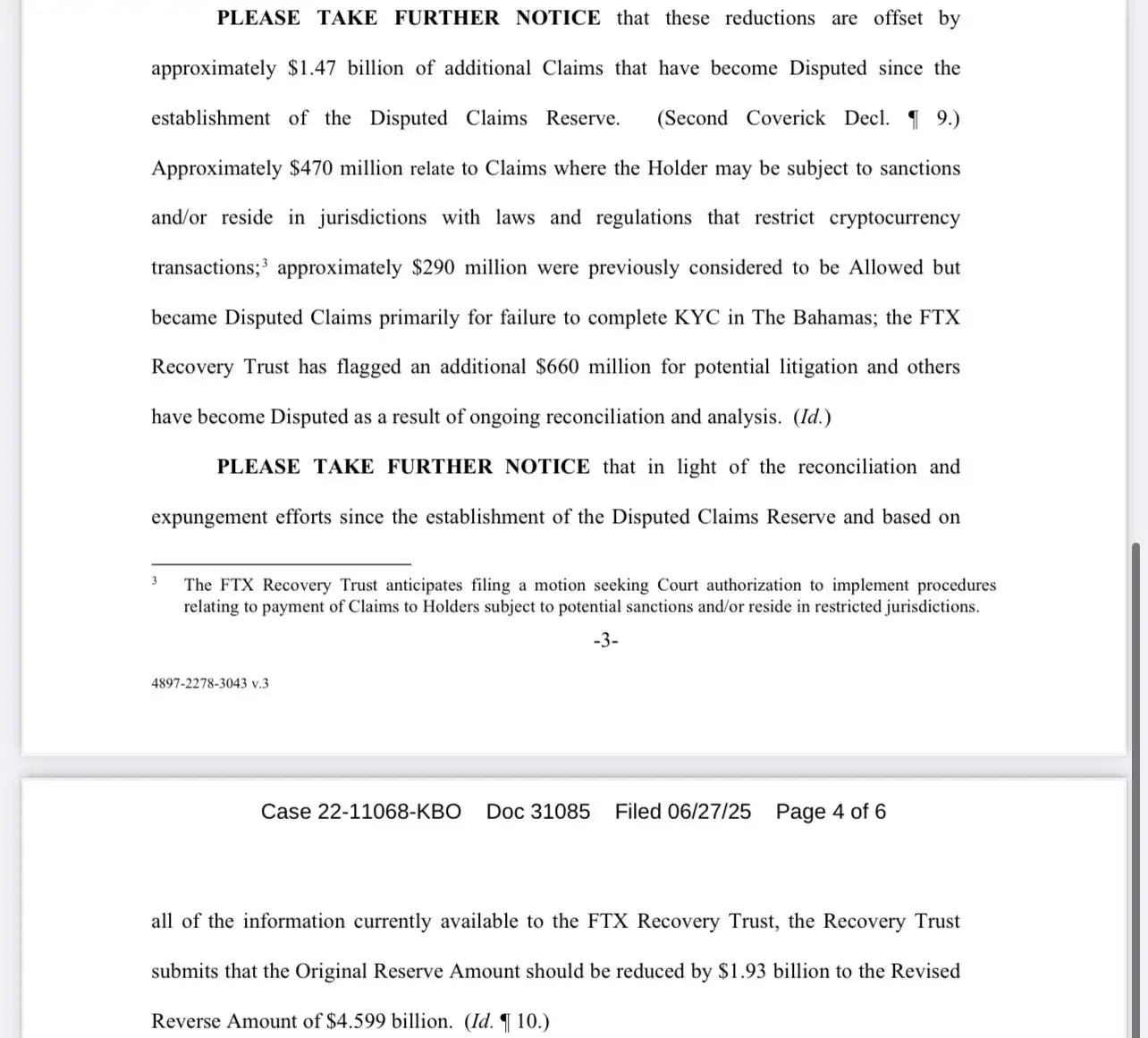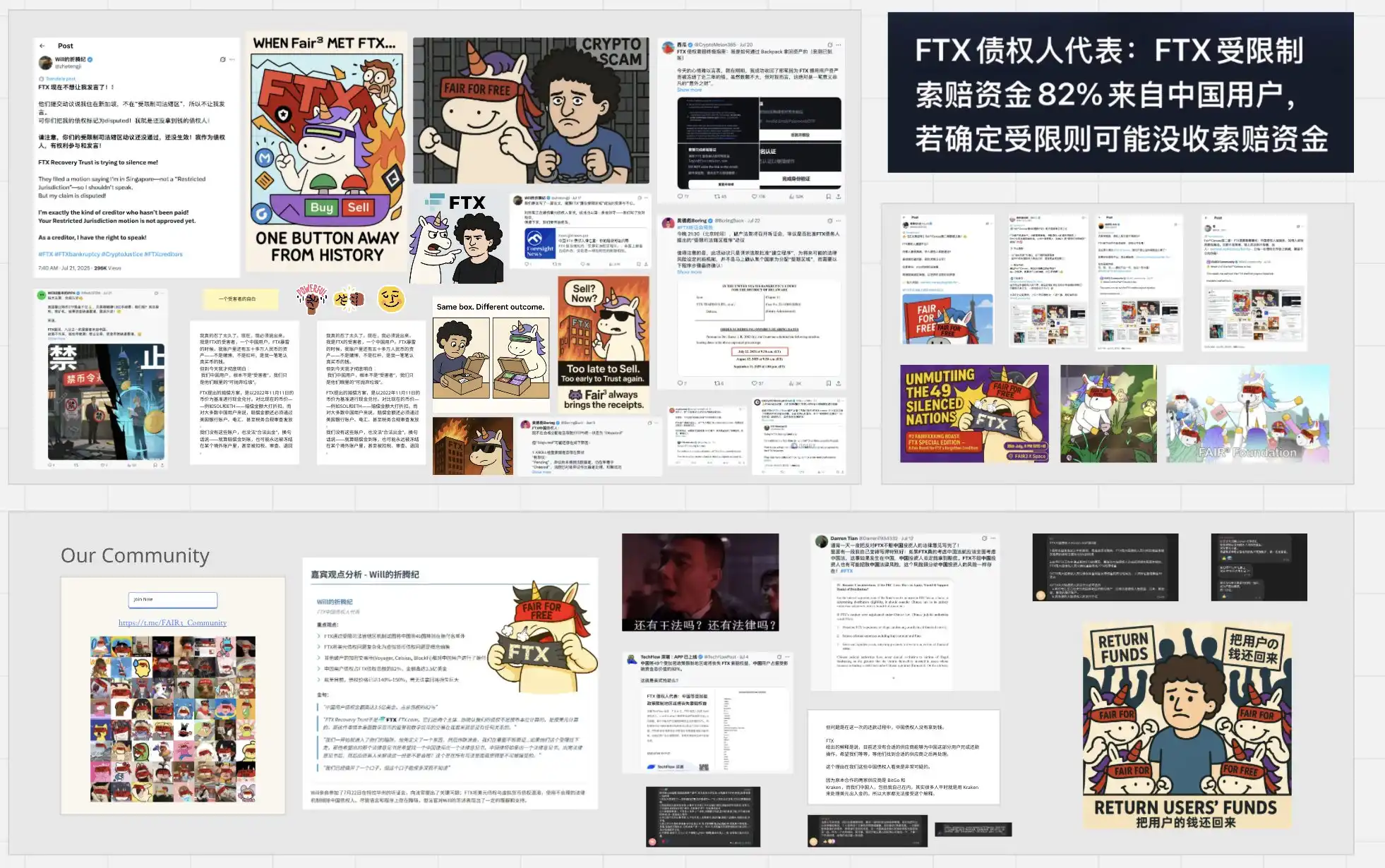Recently, the FTX bankruptcy liquidation process has entered a critical stage. According to the latest distribution plan documents disclosed by the bankruptcy management, creditors from 49 jurisdictions, including mainland China, are proposed to be excluded from the main compensation list during the second round of payouts, sparking widespread controversy. On July 22, the U.S. bankruptcy court held a hearing on this resolution, officially listening to statements from various groups, including Chinese creditors.
In response to this hearing and the potential impairment of repayment rights faced by Chinese users, the decentralized rights advocacy organization Fair 3 Community recently launched an online public discussion themed "Restoring the Truth Behind the Rights Protection of FTX Chinese Creditors." The event aims to build a cross-regional, multi-perspective dialogue platform, inviting representatives of Chinese creditors like Will, legal expert Lawyer Tian, and several community members who have experienced the claims, communication, and compensation processes to jointly analyze the legal structure, procedural risks, and rights protection paths behind the FTX liquidation case, providing information support and action references for a broader range of affected users.

FTX Bankruptcy Progress Review: Creditors from 49 Countries May Be Excluded from Compensation Eligibility
It has been nearly two years since FTX collapsed at the end of 2022. According to materials recently submitted by the official bankruptcy management, the second round of payouts for FTX will follow a stricter "compliance review" system, identifying users from specific jurisdictions as "Restricted Claimants" based on account registration, KYC, trading activities, and other information, thus excluding them from the compensation plan. This list covers 49 countries or regions, including mainland China, Russia, and Iran, with the total amount of claims conservatively estimated to exceed hundreds of millions of dollars.
At the hearing held on July 22, FTX's lawyers cited U.S. financial sanctions and anti-money laundering regulations in an attempt to defend this policy, claiming that there are "legal enforcement risks" and "political sensitivities" in the aforementioned regions. However, several creditor representatives pointed out that this exclusion standard not only lacks legal basis but also fails to adequately consider the verification processes completed during the claims submission, suggesting "selective compensation" and constituting procedural unfairness.

Rights Protection Representative Will: From the Night Before the Collapse to Court Statements, Sharing Two Years of Inner Journey
Will (X account: @zhetengji), an early BTC believer and one of the representatives of FTX creditors in China, systematically shared his rights protection journey during the AMA.
Entry and Asset Damage: Will was a heavy user of FTX, primarily due to its advanced collateral lending features and convenient deposit and withdrawal channels. Just hours before FTX suspended withdrawals in November 2022, he noticed abnormal on-chain funds but ultimately failed to withdraw his assets due to company management structure limitations and insufficient response time.
Psychological and Behavioral Transition: Initially, he chose silence, but as more rights protection information emerged, he gradually became actively involved, first voicing his concerns on social media, then joining multiple creditor discussion groups, and eventually managing to enter the creditors' committee.
Claims Transfer Game: An institution once offered to buy his claims, and he requested a formal email document to ensure safety. Ultimately, due to communication issues, he abandoned the sale and chose to hold on to his claims until now.
Evolution of Rights Protection Strategy: In 2024, Will submitted a ten-page legal opinion to the FTX administrators and personally attended the bankruptcy hearing on July 22, 2025, to advocate for fair rights for Chinese creditors.
Throughout the entire event, Will experienced a full range of emotions from shock and anger to organizing actions. He not only joined the creditors' committee in the bankruptcy process but also actively collected legal materials and contacted legal teams to try to secure a voice for Chinese users. After FTX set the "restricted regions" clause, he promptly organized the Chinese community to draft a legal opinion and continuously pushed for transparency through open letters, tweets, and hearing statements.
Will stated, "This is not just my story, but the reality of countless Chinese investors' rights being ignored. We must continue to speak out until we are heard."
Legal Advisor Lawyer Tian: The Exclusionary Compensation Plan Lacks Legitimate Legal Basis
Guest Lawyer Tian Xiaowan from Beijing DeHeng Law Firm (X account: @DarrenT934332), who has long focused on cryptocurrency asset regulatory policies and cross-border bankruptcy cases, analyzed the "regional exclusion policy" that emerged in the FTX liquidation case from a professional perspective during the discussion.
He pointed out that U.S. bankruptcy law does not explicitly authorize bankruptcy administrators to deprive creditors of their property rights based on "jurisdiction." Even when referencing international sanctions systems, there must be clear applicable evidence, and it cannot be generalized. Lawyer Tian quoted the exclusion logic provided by the FTX management and refuted it point by point, arguing that the relevant judgments are mostly based on geopolitical factors rather than the legal responsibilities of the creditors themselves, which has violated the principle of equal treatment of creditors.
He also noted that China's current policy on virtual currencies mainly focuses on trading and financial system risk control, and there is no clear legal definition of wrongdoing for users holding cryptocurrency assets on overseas trading platforms. "If the FTX management cannot provide sufficient evidence to prove that Chinese users' claims are illegal, they cannot unilaterally exclude them from the compensation process."
Lawyer Tian also urged all affected users to keep complete claims records and pay attention to potential opportunities for collective lawsuits and administrative appeals in the future.
KOL Advocate Woody: Collective Voice is More Penetrating than Individual Shouts
As one of the guests in this discussion, Web3 content creator Woody (X account: @woodycryptow) shared his observations on the impact of community actions and communication. He pointed out that the FTX liquidation controversy is not only a legal issue but also a topic involving the expression of global user rights and media visibility.
Woody stated that in the face of a complex judicial system and cross-border information gaps, individual rights protection often falls into difficulties. However, if community power can be gathered to form systematic communication and sustained attention, there is an opportunity to change the public opinion ecology and judicial perspective. He emphasized, "The unity and collaboration of the community are key variables in influencing the decision-making of large platforms and driving changes in public awareness."
He called for more users to participate in actions, whether by sharing real cases, providing leads to the media, or engaging in community discussions and promoting data collection, all of which are part of shaping a collective voice. Woody believes that the fermentation of such issues is not only related to the current FTX case but also a deep reflection on the governance, fairness, and boundaries of responsibility in the entire cryptocurrency industry.
He also expressed support for the initiative organized by Will and Fair 3 Community, considering it a grassroots collaboration model that demonstrates the potential of decentralized communities in responding to centralized crises.
Comparing Other Cases: Why Did FTX "Go to Such Extremes"?
During the AMA, host Wang Xin also raised the question of why there are many similar cases in the crypto space, yet the path to rights protection for FTX is so difficult. Guest Will added that the exclusivity in FTX's compensation mechanism is rare. He cited examples like Mentougou and OKX, analyzing how these platforms generally adopt a unified approach during liquidation to avoid escalating international conflicts. In contrast, FTX directly excluded specific jurisdictions, which is relatively uncommon in industry history.
Lawyer Tian also pointed out from a policy and legal perspective that while China regulates virtual currency trading, it does not deny users' rights to assert their legitimate rights overseas. He believes, "A platform that attracts users globally and charges fees should bear cross-regional compliance obligations, rather than dividing qualified and unqualified users based on sovereignty during liquidation."
Future Path: Three Types of Rights Protection Action Suggestions
At the end of the meeting, the three guests proposed the following three types of rights protection suggestions:
· First, continue to pressure the U.S. bankruptcy court, submitting complete legal materials and requesting the court to review the legality of the restricted jurisdiction setting;
· Second, expand the dissemination of user stories through social platforms, creating community consensus and forming a cross-language, cross-jurisdictional voice network;
· Third, collaborate with international lawyers to promote the participation of representative creditors in the next round of distribution negotiations, striving for a voice in procedural legality.
Will emphasized, "The most important thing is to let the judge hear our voices and see that we are not anonymous digits, but real users with stories, legitimate rights, and community support."
The Role of Fair 3 Community: A Collective Action Platform in a Decentralized Context
Fair 3 Community is an open collaboration platform initiated by decentralized advocates, dedicated to providing organized action mechanisms for global Web3 users facing unfair phenomena. In the FTX compensation event, Fair 3 launched the "FTX Co-Creation Canvas" program, encouraging excluded users to submit complete claims records, assisting in data and case collection, and facilitating connections with legal aid and media resources. In the future, Fair 3 will also provide expression space for anonymous users through "legal interpretation documents," "consensus canvases," and other forms, continuously promoting broader collective actions.

Fair 3 stated that it will continue to track the legal dynamics of the FTX liquidation process and promote possible collective lawsuits or legal negotiations based on community consensus. This event will also become an important case for Fair 3 in promoting the construction of a "cross-border asset rights protection mechanism for Web3 users" globally.
If you are also a victim of FTX, you can join the Fair 3 Creditor Rights Protection Group
This article is from a submission and does not represent the views of BlockBeats.
免责声明:本文章仅代表作者个人观点,不代表本平台的立场和观点。本文章仅供信息分享,不构成对任何人的任何投资建议。用户与作者之间的任何争议,与本平台无关。如网页中刊载的文章或图片涉及侵权,请提供相关的权利证明和身份证明发送邮件到support@aicoin.com,本平台相关工作人员将会进行核查。



